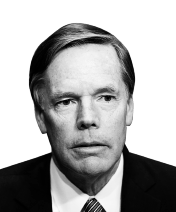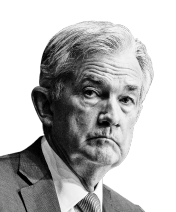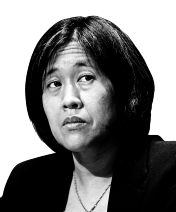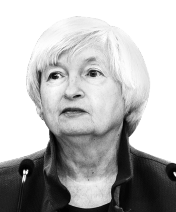
To access the Biden Power Map, sign up for FP Insider, a data-driven subscription service from Foreign Policy that gives professionals critical insights into the global issues impacting their business.
FP Insiders get full access to this and all Power Maps and Special Reports created by FP Analytics, Foreign Policy’s research division.
We work closely with organizations from all sectors to activate FP Insider access at scale—and at maximum savings. Learn more and request an FP Insider demo.
Economic Competitiveness
The Biden Power Players
UPDATED August 20, 2021-

Nicholas Burns
U.S. Ambassador to China (Nominee), U.S. Department of State
Relevance to the Biden Agenda:
As one of the primary U.S. representatives to China, the incoming ambassador will be tasked with navigating an increasingly tense relationship. As the Biden administration seeks to increase cooperation with China on combatting climate change, it must do so in an environment where it is simultaneously portraying China as one of the top U.S. antagonists. The incoming ambassador will navigate relations through the ongoing trade war, the U.S. declaration that China’s actions in Xinjiang constitute genocide, the U.S. campaign to push China out of 5G technology, a series of challenges surrounding China’s technology transfer and monetary practices, and its increasing territorial aggressiveness toward Hong Kong and Taiwan.
Biography:
A career foreign service officer, Burns served as the undersecretary of state for political affairs and ambassador to NATO during the George W. Bush administration. As the undersecretary of state, he led successful U.S. negotiations on India’s nuclear program, a military assistance program with Israel, and Iran’s nuclear program. After leaving government, Burns served as the executive director of the Aspen Strategy Group and was brought on by Antony Blinken to be an advisor to the 2020 Biden presidential campaign. In 2020, Burns characterized the U.S.-China relationship as being at its lowest point since normalization under President Nixon. Despite expressing concerns over the competitive challenge that China poses to the U.S., he has proposed cooperation with China on combating climate change and COVID-19.
-

Jerome Powell
Chair, Board of Governors of the Federal Reserve System, Federal Reserve System
Relevance to the Biden Agenda:
Former President Trump appointed Powell to replace Janet Yellen in 2018. Powell will continue to serve his term current four-year term under Biden through 2022. He is responsible for overseeing the monetary response to the COVID-19 pandemic and spearheaded the Fed’s aggressive measures to boost the economy at its onset. Powell cut U.S. interest rates to near-zero in March 2020; lent $2.3 trillion to support households, employers, financial markets, and state and local governments; and temporarily relaxed regulatory requirements on bank lending, among other measures. Powell will be expected to work closely with Treasury Secretary Janet Yellen as they manage the government’s response to the pandemic. He has indicated a willingness to discuss the uneven impacts of the pandemic on minority groups and low-income workers, a concern that Yellen has raised as a critical issue to address.
Biography:
Powell succeeded Janet Yellen as chair of the Federal Reserve in 2018, and his term current term extends through 2022. In 2012, former President Obama nominated Powell to the Federal Reserve Board of Governors. At the time of his nomination, Powell was an influential investment banker and had previously served in the Treasury Department as the Undersecretary for Finance from 1992 to 1993. As Fed chair, Powell previously warned of slowing global growth stemming from China’s economic slowdown, but he has expressed optimism over the post-COVID economic recovery in the U.S. During the Trump administration, he expressed concerns over the impact of trade wars with China and U.S. allies and was broadly supportive of the U.S.-Mexico-Canada Agreement (USMCA).
-
Richard Clarida
Vice Chair, Board of Governors of the Federal Reserve System, Federal Reserve System
-
Randal Quarles
Vice Chair for Supervision, Board of Governors of the Federal Reserve System, Federal Reserve System
-
-

Gina Raimondo
Secretary of Commerce, U.S. Department of Commerce
Relevance to the Biden Agenda:
Economic Competitiveness:
The U.S. Department of Commerce’s primary roles in enforcing international trade rules and investing in economic innovation make it central to Biden’s goals surrounding economic competitiveness, particularly regarding U.S.-China economic competition. In its 2018–2022 strategic plan, the Department of Commerce laid out plans to increase investment in artificial intelligence, commercial space activities, and intellectual property protection. It also outlined goals to increase U.S. exports by advocating for U.S. companies across world markets, increasing enforcement of existing trade laws and international trade agreements, and enhancing cybersecurity protections. Raimondo will oversee the Department of Commerce’s efforts to drive U.S. innovation, expand broadband access in rural America, and safeguard U.S. companies’ intellectual property, which has been a particularly contentious issue with China. She supports government efforts to increase women’s employment opportunities through paid family leave and universal pre-kindergarten and has argued in favor of including these measures in the Senate’s reconciliation infrastructure package.
Climate Change:
Raimondo prioritized investment in offshore wind power as Rhode Island’s governor, and alongside Secretary of Energy Jennifer Granholm and Secretary of the Interior Debra Haaland she has proposed creating 30 gigawatts of offshore wind power within the decade. The project aims to create 80,000 jobs, and Raimondo has emphasized the importance of using similar projects to simultaneously provide climate solutions and spur economic growth. Raimondo will also direct the National Oceanic and Atmospheric Administration (NOAA), the government’s top climate information agency, which is instrumental for analyzing and sharing data on the climate crisis and its impacts.
Cyber & Tech:
The Department of Commerce oversees trade restrictions on companies through the Bureau of Industry and Security’s entity list. Among the most notable companies on the trade blacklist are Huawei and ZTE, as well as other large Chinese technology companies. Raimondo has stated her intent to keep existing restrictions on Chinese companies in place, citing concerns such as People’s Liberation Army connections and labor practices. The Department of Commerce is also responsible for ensuring the safety and reliability of the U.S.’s digital economy, and Raimondo will lead the agency in an era when cyberthreats and attacks are increasingly frequent. She will partner with the private sector to address supply-chain vulnerabilities exposed in the SolarWinds attack, as well as expand broadband and 5G access to rural regions.
Biography:
Since 2015, Raimondo had served as the governor of Rhode Island before being confirmed as secretary of commerce. As governor, Raimondo made investments in technology and clean energy. She spearheaded the $100,000 Lean Government Initiative to modernize the state government’s technology infrastructure and oversaw the construction of the nation’s first offshore wind farm in 2016. During the COVID-19 pandemic, Raimondo introduced a website designed to help find accommodations for health care workers who were forced to quarantine, and introduced a contact-tracing and information-sharing app for Rhode Island residents. Despite prioritizing technological innovation as governor, Raimondo faced criticism for eliminating the state’s top cybersecurity position. Prior to serving as governor, Raimondo reworked the state’s pension fund as Rhode Island’s general treasurer and had a successful career in venture capital.
Points of Interest and Notable Connections:
Raimondo has primarily served at the state level in her home state of Rhode Island, first as general treasurer and then as governor. She had been a Rhodes Scholar, and she joined the Biden administration directly from her governorship, resigning on the same day as her Senate confirmation. She governed as a moderate in a very liberal state, and her 2019 approval numbers placed her as the lowest-rated governor in the nation. However, her leadership throughout the COVID-19 pandemic caused her ratings to skyrocket. Prioritizing clear and open communication with her constituents, Raimondo hosted a virtual town hall with the National Institute of Health’s (NIH) Anthony Fauci to explain the status of Rhode Island’s school closures last summer. She launched a large project with Thomas Kurian, the CEO of Google Cloud, called “Back to Work RI,” to connect residents who had lost their jobs during the pandemic with employment opportunities. During the 2020 Democratic presidential primary, Raimondo initially endorsed former Mayor of New York City Michael Bloomberg before switching her support to Biden after Bloomberg quit the race. Prior to her service in government, Raimondo worked in venture capital and received backing from Bain Capital, one of the world’s largest investment firms co-founded by Senator Mitt Romney.
-
Roger Clark
Senior Advisor for National and Cyber Security, Office of the Secretary, U.S. Department of Commerce
-
Donet Graves
Deputy Secretary of Commerce, U.S. Department of Commerce
-
Antwaun Griffin
Senior Advisor for COVID-19, Office of the Secretary, U.S. Department of Commerce
-
Jonathan Kanter
Assistant Attorney General for Antitrust (Nominee), U.S. Department of Justice
-
Leslie Kiernan
General Counsel, U.S. Department of Commerce
-
John Yang
Senior Trade and Strategic Initiatives Advisor, Office of Policy and Strategic Planning, U.S. Department of Commerce
-
-

Katherine Tai
U.S. Trade Representative, Office of the U.S. Trade Representative, Executive Office of the President
Relevance to the Biden Agenda:
As the highest U.S. representative on trade issues, Katherine Tai is set to play a key role in navigating ongoing trade conflicts with China, among other top U.S. trade partners. Tai will serve as Biden’s principal trade advisor, negotiator, and spokesperson on trade issues. She will also play a critical role in addressing intellectual property protection for U.S. companies and in representing U.S. trade interests before the World Trade Organization (WTO). As the U.S. continues to negotiate trade deals with China and Taiwan, Tai will be one of the U.S.’s primary advisors and negotiators.
Biography:
From 2007 through 2014, Tai served in the Office of U.S. Trade Representative, rising to the role of chief counsel for China enforcement in 2011. In that position, she argued against Chinese trade practices before the WTO on behalf of the U.S. Tai has been consistently critical of China’s trade practices, and she emphasizes the need for the U.S. to work with like-minded partners, such as the EU and Japan, to rival China’s economic influence. From 2017 to 2021, Tai worked for the House Ways and Means Subcommittee on Trade as the chief counsel, where she argued for trade measures that would strengthen U.S. industry’s competitive position against China while preserving democratic freedoms. She was part of the U.S. delegation that negotiated the U.S.-Mexico-Canada Agreement and a key advocate for the deal in Congress.
Points of Interest and Notable Connections:
Tai began her career in law and has worked for several firms, including Baker & McKenzie, as well as clerking for U.S. District Courts in Washington, D.C. and Maryland. She is widely considered a non-partisan consensus builder and was confirmed in the Senate by a vote of 98–0. Tai is fluent in Mandarin and her parents were both born in mainland China, but grew up in Taiwan before immigrating to the U.S. She worked in China as a teaching fellow in the late 1990s.
-
Sarah Bianchi
Deputy U.S. Trade Representative (Nominee), Office of the U.S. Trade Representative, Executive Office of the President
-
Sandra Oudkirk
Director, American Institute in Taiwan, U.S. Department of State
-
Maria Pagan
Deputy U.S. Trade Representative to the World Trade Organization (Nominee), Office of the U.S. Trade Representative, Executive Office of the President
-
Jayme White
Deputy U.S. Trade Representative (Nominee), Office of the U.S. Trade Representative, Executive Office of the President
-
-

Janet Yellen
Secretary of the Treasury, U.S. Department of the Treasury
Relevance to the Biden Agenda:
Economic Competitiveness:
As the chief financial officer of the federal government, Yellen will be responsible for advising Biden on all financial, economic, tax, and budget policies, both domestically and internationally. Yellen will play a critical role in determining U.S. investment policies, including Biden’s efforts to increase U.S. investment in clean energy and emerging technologies. She will also influence U.S. trade policies with its allies, as the Treasury is one of the primary agencies responsible for assessing U.S. trade partners’ compliance with international trade acts. Under Yellen, the Treasury’s first report on U.S. trading allies’ activities, released in April 2021, pressed China to improve transparency around its management of currency exchange rates and the activities of its state-owned banks. Internationally, the Treasury Department oversees the implementation of sanctions and targets financial support networks of actors deemed U.S. security threats. At the June 2021 summit of the Group of Seven (G7), whose member states comprise approximately 45 percent of the global economy, Yellen secured an international tax agreement. If enacted through approval from Congress, the agreement will require companies to pay an income tax of at least 15 percent, regardless of where they are based, thus making it less financially beneficial to relocate operations to countries with lower tax rates.
Arms Control & Nuclear Proliferation:
The Treasury Department oversees the U.S.’s sanctions regime, which it has used to curb North Korea and Iran’s nuclear programs. The overall effectiveness of these sanctions has been a source of debate, and Yellen is more skeptical than her predecessors in the Trump administration were over their effectiveness. In her confirmation hearings, Yellen did not indicate that she would lift existing sanctions, but she did state that she would task Deputy Secretary of the Treasury Adewale Adeyamo with reviewing their efficacy.
Climate Change:
Yellen intends to launch a campaign to promote climate solutions and address the economic contributors of climate change. She will work with other major greenhouse gas-emitters such as China, the EU, and India to promote the goals of the Paris Agreement. Yellen will oversee public investments aimed at transitioning to a decarbonized economy and meeting President Biden’s goal of net-zero emissions by 2050. The Treasury Department’s Financial Stability Oversight Council will also analyze and report on the financial risks of climate change. Yellen intends to share their data and findings with the private sector.
Cyber & Tech:
Yellen has expressed concerns about the increase in cybercrime during the COVID-19 pandemic and the use of cryptocurrency to launder drug profits and finance terrorism. The Treasury Department is set to re-examine how it targets illegal transactions according to the 2020 Anti-Money Laundering Act to address new challenges from cryptocurrencies. Yellen has also voiced concern over China’s forced technology transfers and subsidies for its domestic high-tech industries.
Pandemic Response:
Throughout the pandemic, Yellen has emphasized the outsized economic burden it has placed on women globally. She is focused on mitigating these impacts while eliminating persistent barriers to entry for women in the global labor market. Yellen has pushed the IMF to grant more aid to countries that are struggling against COVID-19, through using IMF currency reserves to provide liquidity for low-income countries and to facilitate recovery efforts. She will also help shape future spending packages to help the domestic pandemic recovery.
Biography:
Yellen served as vice chair of the Federal Reserve from 2010 to 2014 and as chair from 2014 to 2018. During her tenure, Yellen continued to lead the federal government’s monetary policy response to the fallout from the 2008 financial crisis. She ended the quantitative easing measures put in place to boost the economy during the Obama administration’s first term and raised interest rates for the first time since the onset of the crisis. Prior to her work at the Fed, Yellen chaired former President Clinton’s Council of Economic Advisors (CEA) from 1997 to 1999, where she led the administration’s efforts to combat the gender pay gap.
Points of Interest and Notable Connections:
Yellen has served as an influential figure in the federal government’s economic policy since the Clinton administration and assumes her current role as the first Secretary of the Treasury to have served as the chair of both the Fed and the Council of Economic Advisors (CEA). On the CEA, Yellen worked with David Marchick on international trade policy and lobbied against sanctions at the state and local levels. As chair of the Fed, Yellen made efforts to bring women into the workforce and address systemic inequality a priority. She formed relationships with the chief economic formulators around the world, such as the president of the European Central Bank, Christine Lagarde. Yellen served alongside Jerome Powell on the Federal Reserve’s Board of Governors from 2012 to 2018. Despite differences in political party affiliation, Yellen and Powell have generally voted together on most issues. Since leaving her post as chair of the Fed, Yellen has made a number of paid speeches before large technology corporations and banks such as Citigroup, Goldman Sachs, and Alphabet (Google). She also was invested in companies such as Pfizer and AT&T but pledged to divest herself from them before assuming her current post.
-
Adewale Adeyemo
Deputy Secretary of the Treasury, U.S. Department of the Treasury
-
William Fields
Senior Advisor to the Secretary, U.S. Department of the Treasury
-
David Lipton
Counselor to the Secretary, U.S. Department of the Treasury
-
Matthew Wiegmann
Senior Advisor for Technology and Delivery, Office of the Secretary, U.S. Department of the Treasury
-
Catherine Wolfram
Deputy Assistant Secretary for Climate and Energy Economics, Office of Economic Policy, U.S. Department of the Treasury
-
-
Lloyd Austin
Secretary of Defense, U.S. Department of Defense
Austin will be responsible for securing U.S. shipping routes and ensuring that maritime trade with East Asia continues unhindered, a mounting challenge in the face of increased U.S.-China regional tensions. Read more about Austin’s role in the Biden administration here.
-
Daniel Hornung
Assistant to the President for Economic Policy, Executive Office of the President
From 2020 to 2021, Hornung served as a law clerk to Chief Judge Merrick Garland on the U.S. Court of Appeals for the D.C. Circuit. He had previously served as a senior policy advisor to former President Obama from 2016 to 2017, having joined the White House as a policy advisor in 2015. Prior to joining the Obama White House, Hornung worked at the Office of Management and Budget (OMB) as an assistant to the deputy director working on economic and fiscal policy.
-
Lina Khan
Chair, Federal Trade Commission
Khan is a pioneering expert on antitrust regulation to combat Big Tech’s market domination. She was deemed “a new leader” on the subject after publishing her celebrated Yale Law Journal article “Amazon’s Antitrust Paradox.” Khan previously served as a legal fellow for former Federal Trade Commissioner Rohit Chopra and as counsel to the House Judiciary Subcommittee on Antitrust, Commercial, and Administrative Law.
-
Terrence McCartin
Assistant U.S. Trade Representative for China Affairs, United States Trade Representative, Executive Office of the President
Until 2017, McCartin was the deputy assistant U.S. trade representative for China affairs. From 2001 to 2006, he investigated China’s trade practices as the senior director for monitoring and enforcement for China. He was responsible for reporting China’s violations to the World Trade Organization (WTO).
-
Jessica Rosenworcel
Chair (Acting), Federal Communications Commission
Rosenworcel has a long history at the Federal Communications Commission (FCC), working there from 1999 to 2007 and then serving as a Democratic commissioner from 2012 to 2017. She has advocated for increased rural access to broadband, particularly as a benefit to children and those needing telemedicine, and for the encouragement of women in technology.
-
Cecilia Rouse
Chair, Council of Economic Advisors
Rouse, a famed economist, has spent her career between government and academia, serving as the dean of the Princeton School of Public and International Affairs from 2012 to 2021. She previously had been a member of the Council of Economic Advisors (CEA) from 2009 to 2011, where she worked with Congress to pass the 2009 Recovery Act.
-
Jake Sullivan
White House National Security Advisor, National Security Council, Executive Office of the President
Sullivan will serve as one of the administration’s chief decision-makers on China policy. Alongside Antony Blinken, he met with China’s foreign minister, Wang Yi, and top diplomat Yang Jiechi on March 18, 20201, to discuss China’s actions in Xinjiang and Hong Kong as well as ongoing tensions over trade and cyber activity. Read more about Sullivan’s role in the Biden administration here.
-
Martin Walsh
Secretary of Labor, Department of Labor
Walsh is the first Secretary of Labor to have been a union leader in over 40 years, and his candidacy garnered widespread support among labor rights activists. He argued in favor of the American Rescue Plan, framing it as critical for the U.S.’s post-COVID economic recovery, and he will be responsible for helping return U.S. employment to pre-pandemic levels.
-
Tim Wu
Special Assistant to the President for Technology and Competition Policy, Executive Office of the President
The creator of the term “net neutrality,” Wu has served as an advisor to the Federal Trade Commission (FTC), particularly in regards to internet freedom, and to former President Obama as a member of the National Economic Council. His work has significantly impacted Big Tech and its relationship with government; his theoretical analysis became the underpinning of Google’s fight against Chinese internet censorship at the World Trade Organization (WTO).
Read the Full Policy Priority Briefing ➞
The Biden Administration Plan for Increasing U.S. Domestic and International Competitiveness
Key challenges:
- Unemployment is high, and U.S. GDP experienced its largest post-WW II contraction in 2020 due to the ongoing COVID-19 pandemic.
- The Biden administration inherits ongoing trade tensions with China, the EU, Canada, Asia-Pacific, and the WTO as well as a difficult decision on continuing Trump’s tariff regimes.
- In the context of a deteriorating U.S.-China relationship, the Biden administration faces myriad China-related economic challenges ranging from intellectual property protection to market access.

